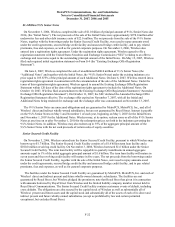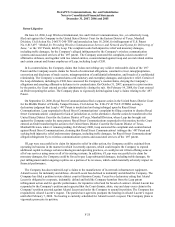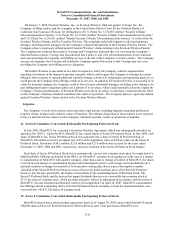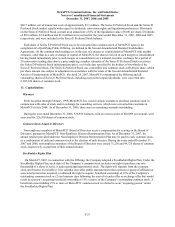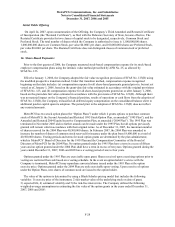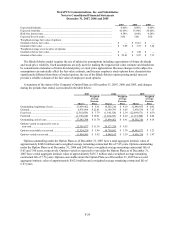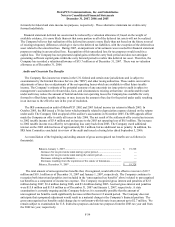Metro PCS 2007 Annual Report Download - page 123
Download and view the complete annual report
Please find page 123 of the 2007 Metro PCS annual report below. You can navigate through the pages in the report by either clicking on the pages listed below, or by using the keyword search tool below to find specific information within the annual report.MetroPCS Communications, Inc. and Subsidiaries
Notes to Consolidated Financial Statements
December 31, 2007, 2006 and 2005
F-24
The Company has committed or expects to commit to spend in the first half of 2008 an aggregate of between
$360 million and $375 million in cash to acquire assets to support its networks in existing markets or markets the
Company is building, including assets related to the acquisition of, conversion of, buildout of, and launch of service
in Jacksonville, Florida.
The Company has an agreement with Lucent Technologies, Inc., or Lucent, now known as Alcatel Lucent, to
provide it with PCS and AWS CDMA system products and services, including without limitation, wireless base
stations, switches, power, cable and transmission equipment and services with an initial term through the earlier to
occur of (1) December 31, 2011, or (2) the date on which the Company has purchased or licensed products, services
and licensed materials under the agreement equal to a sum which it currently expects to spend for products, services,
or licensed material from Alcatel Lucent from June 6, 2005 through December 31, 2011. The agreement provides
for both exclusive and non-exclusive pricing for PCS and AWS CDMA products and the agreement may be renewed
at the Company’ s option on an annual basis for three additional years after its initial term expires. If the Company
fails to continue purchasing its PCS and AWS CDMA products exclusively from Alcatel Lucent, it may have to pay
certain liquidated damages based on the difference in prices between exclusive and non-exclusive prices, which
would be material to the Company. As of December 31, 2007, the Company had issued purchase orders in the
amount of $30 million for products, materials and services to be delivered during the three months ended March 31,
2008.
AWS Licenses Acquired in Auction 66
Spectrum allocated for AWS currently is utilized by a variety of categories of commercial and governmental
users. To foster the orderly clearing of the spectrum, the FCC adopted a transition and cost sharing plan pursuant to
which incumbent non-governmental users could be reimbursed for relocating out of the band and the costs of
relocation would be shared by AWS licensees benefiting from the relocation. The FCC has established a plan where
the AWS licensee and the incumbent non-governmental user are to negotiate voluntarily for three years and then, if
no agreement has been reached, the incumbent licensee is subject to mandatory relocation where the AWS licensee
can force the incumbent non-governmental licensee to relocate at the AWS licensee’ s expense. The spectrum
allocated for AWS currently is utilized also by governmental users. The FCC rules provide that a portion of the
money raised in Auction 66 will be used to reimburse the relocation costs of governmental users from the AWS
band. However, not all governmental users are obligated to relocate and some such users may delay relocation for
some time. For the year ended December 31, 2007, the Company incurred approximately $0.9 million in microwave
relocation costs. No relocation costs were incurred for the year ended December 31, 2006.
FCC Katrina Order
In October 2007, the FCC released an Order on Reconsideration (“Reconsideration Order”) which requires the
Company to maintain emergency backup power for a minimum of twenty-four hours for assets that are normally
powered from local commercial power and located inside mobile switching offices, and eight hours for assets that
are normally powered from local commercial power and at other locations, including cell sites and DAS nodes. The
Company will not be required to comply immediately with these minimum backup power requirements where the
Company can demonstrate that such compliance is precluded by: (i) federal, state, tribal or local law; (ii) risk to
safety of life or health; or (iii) private legal obligation or agreement. In addition, within six months of the effective
date of the Reconsideration Order, which is the date of the federal register publication announcing Office of
Management and Budget approval of the information collection requirements, the Company will be required to file a
report with the FCC providing certain information with respect to compliance with the backup power requirements.
In cases where the Company identifies assets that were designed with less than the required emergency backup
power capacity and that is not precluded from compliance, the Company must comply with the backup power
requirement or, within 12 months from the effective date of the rule, file with the FCC a certified emergency backup
power compliance plan. That plan must certify that and describe how the Company will provide emergency backup
power to 100 percent of the area covered by any non-compliant asset in the event of a commercial power failure. If
the Company is required to comply with the Reconsideration Order the Company may be required to purchase
additional equipment, spend additional capital, seek and receive additional state and local permits, authorizations
and approvals, and incur additional operating expenses to comply with the Reconsideration Order and such costs
could be material. The Company could be forced to also discontinue service from some sites or in some areas due to
the new rules.










